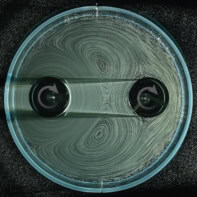Physicists in the US have transformed deuterium into a metal by using a high-intensity laser to shock-compress liquid deuterium to pressures up to 340 gigapascals. They found that the liquid changed from an insulating molecular fluid to an atomic metallic fluid at a pressure of 100 gigapascals. The research could have implications for scientists studying the interiors of Jupiter and the other large planets, stars and thermonuclear fusion.
Gilbert Collins and colleagues used the NOVA laser at the Lawrence Livermore National Laboratory in California to carry out the experiments (Science 281 1178). The deuterium was placed in a small copper cell with a plunger fitted at one end. When the laser hits the plunger, it sends a shock wave through the chamber. By shining a beam of X-rays through two windows in the cell, Collins and co-workers were able to measure the shock speed – and hence the pressure and density of the deuterium – in the few nanoseconds before the sample flew apart. Another laser measures the reflectivity of the deuterium, which increases when the molecular fluid changes into a metallic fluid. Collins and colleagues discovered that deuterium compresses more easily than predicted by theory. “A lot of their data disagrees with every [theoretical] model available” writes David Ceperley, a theorist at the University of Illinois, in an accompanying article. The data might be able to explain why Saturn is so warm, and why Jupiter has such a strong magnetic field.



